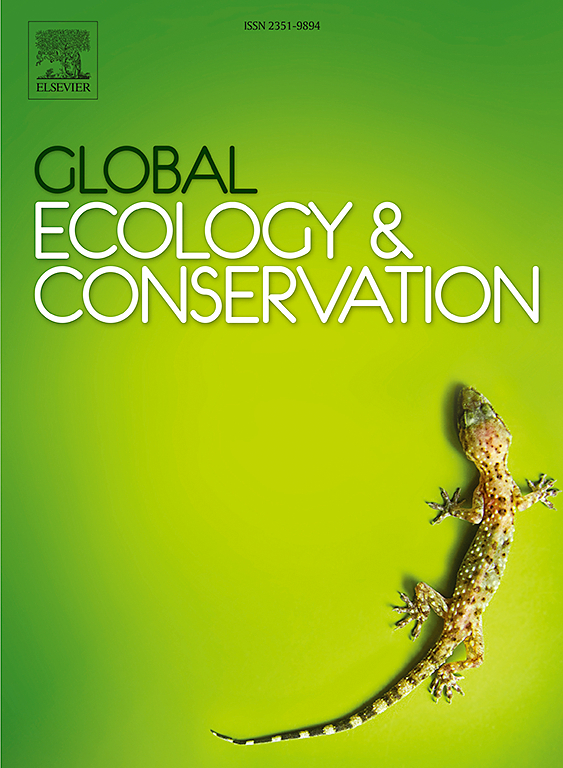Plant-root-litter-soil C, N, P stoichiometry and plant phosphorus accumulation and utilization response to warming and phosphorus input in desert steppe
IF 3.5
2区 环境科学与生态学
Q1 BIODIVERSITY CONSERVATION
引用次数: 0
Abstract
Nutrient cycling in desert steppe can be affected by continuous climate warming and exogenous nutrient inputs. This would alter plant nutrient uptake and utilization, affecting the plant production and service functions of desert ecosystems. However, we know remarkably little about the patterns of the plant-root-litter-soil system nutrient redistribution response to warming and phosphorus input in the P-limited desert steppe. The relationships between plant-root-litter-soil C, N, P contents, stoichiometry, and plant, root phosphorus accumulation and utilization are unclear. In this study, open-top chambers (OTCs) were used to simulate climate warming. We experimented with warming and phosphorus fertilizer application to explore the changes in C, N, P contents and stoichiometry along the plant-root-litter-soil continuum, and the relationships with plant, root phosphorus accumulation, and phosphorus utilization efficiency. The study demonstrated that warming increased root C, N contents, and root N:P, without a corresponding change in phosphorus content across the plant-root-litter-soil continuum. Phosphorus addition significantly elevated plant P, root P, litter P, and soil available phosphorus (AP) and decreased its C:P and N:P. Thereby boosting plant, root phosphorus accumulation and reducing plant, root phosphorus utilization efficiency, further affecting plant production. The key influence factors of plant, root phosphorus accumulation and utilization efficiency were root P, root C:N, and plant C:P. The results highlighted that the altered plant-root-litter-soil C:N:P stoichiometry induced by warming and exogenous phosphate fertilizer input would regulate plant, root phosphorus uptake and utilization patterns to adapt to the P-deficient soil environment in desert steppe.
荒漠草原上植物-根系-土壤-C、N、P 的化学计量以及植物磷积累和利用对气候变暖和磷输入的响应
沙漠草原的养分循环会受到持续气候变暖和外源养分输入的影响。这将改变植物对养分的吸收和利用,影响荒漠生态系统的植物生产和服务功能。然而,我们对植物-根系-土壤-土壤系统养分再分配对气候变暖和磷输入的响应模式知之甚少。植物-根系-土壤-土壤的碳、氮、磷含量、化学计量以及植物、根系磷积累和利用之间的关系尚不清楚。在这项研究中,我们使用了敞口箱(OTC)来模拟气候变暖。我们以气候变暖和施用磷肥为实验条件,探讨了植物-根系-土壤-土壤连续体中碳、氮、磷含量和化学计量的变化,以及与植物、根系磷积累和磷利用效率之间的关系。研究表明,气候变暖增加了根系的碳、氮含量和根系的氮磷比,但植物-根系-土壤的磷含量没有发生相应的变化。磷的添加明显提高了植物磷、根系磷、枯落物磷和土壤可利用磷(AP),并降低了其 C:P 和 N:P。从而增加了植物、根系磷的积累,降低了植物、根系磷的利用效率,进一步影响了植物产量。植物根系磷积累和利用效率的关键影响因素是根系磷、根系 C:N 和植物 C:P。研究结果表明,气候变暖和外源磷肥投入引起的植物-根系-土壤C:N:P平衡关系的改变将调节植物根系对磷的吸收和利用模式,以适应荒漠草原缺磷的土壤环境。
本文章由计算机程序翻译,如有差异,请以英文原文为准。
求助全文
约1分钟内获得全文
求助全文
来源期刊

Global Ecology and Conservation
Agricultural and Biological Sciences-Ecology, Evolution, Behavior and Systematics
CiteScore
8.10
自引率
5.00%
发文量
346
审稿时长
83 days
期刊介绍:
Global Ecology and Conservation is a peer-reviewed, open-access journal covering all sub-disciplines of ecological and conservation science: from theory to practice, from molecules to ecosystems, from regional to global. The fields covered include: organismal, population, community, and ecosystem ecology; physiological, evolutionary, and behavioral ecology; and conservation science.
 求助内容:
求助内容: 应助结果提醒方式:
应助结果提醒方式:


